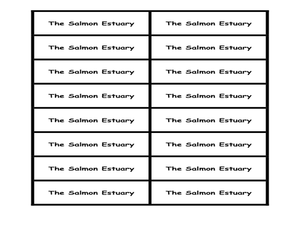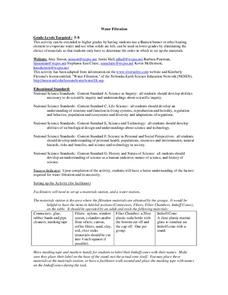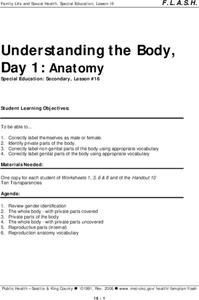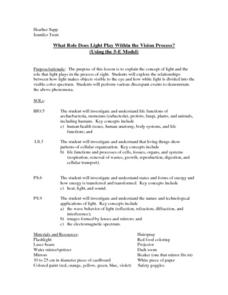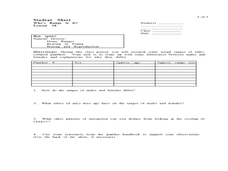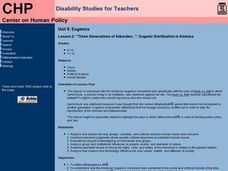Curated OER
The Effects of "Recreational" Drugs on the Development of Chick Embryos as a Model for Human Embryogenesis
Young scholars conduct experiments on fertilized chicken embryos to determine the possible developmental effects that various recreational drugs (caffeine, alcohol, nicotine, and aspirin) might have on them.
Curated OER
Plants and Animals, Partners in Pollination
Students participate in multiple hands-on activities to explore reproduction and pollination. In groups, using a cotton swab and powder, students simulate being pollinators and plants. They name the parts of the flowers and the function...
Curated OER
The Salmon Estuary And Human Impacts
Students have discussions and complete activities about the pacific salmon life cycle and marine parasites. In this salmon lesson plan, students complete activities such as observing sea lice, playing a tag game, and a board game.
Curated OER
Flowering Phenology: How Do Plants Know When To Flower?
Students explore the biotic and abiotic factors that affect plant reproduction and the potential consequences of human activities on plant populations. The effects of urbanization are discussed as an influence in the consequences.
Curated OER
Water Filtration
Learners investigate our water system and how it is filtered. In this science lesson, students perform a laboratory activity to investigate the process that goes into filtering water. They relate this activity to other subject areas...
Curated OER
Understanding the Body, Day 1: Anatomy
Students review gender identification and label themselves female or male. They identify the parts of the human body and practice using appropriate vocabulary. They complete a worksheet to complete the lesson plan.
Curated OER
What Role Does Light Play Within the Vision Process?
Students are introduced to the relationship between light and vision. In groups, they participate in experiments to discover how different wavelengths are divided in the visible spectrum. They record their answers and discuss their...
Curated OER
Ecosystems and Remote Sensing
Young scholars obtain remote sensing data to compare and contrast global biomass data with global temperature data.
Curated OER
Cell Wall Recipe: A Lesson on Biofuels
Biotech engineers discover that changes in the DNA code for cell wall formation can help create crops better suited for biofuel production. They extract DNA from wheat germ. They decode paper strips with codes and relate the activity to...
Curated OER
Who's Range is it?
Students investigate the habits of panthers by analyzing radio transmitted data. In this animal life lesson, students utilize computers to view the range of different statistics dealing with Florida panthers. Students complete a...
Curated OER
Spider Safari
Today we are talking about one of the stealthiest, sneakiest, and most intriguing insects of all times, the spider. Learners will examine the predatory nature of these super bugs as they conduct a spider safari survey. Each child will...
Curated OER
Time Lapse Seed Germination with the QX3 Intel Digital Microscope
Students use the time-lapse feature of the QX3 Intel Digital Microscope
to observe germination of seeds. They use the QX3 Intel Digital microscope to create time lapse video films of seed germination experiments.
W.K. Kellogg Biological Station
Succession: Patterns in the Field and in Seeds
Have you been wondering how to use that natural trail at or near your school? This activity gets kids outside with a purpose: learn about ecological succession through field observations and collecting seed and soil samples. The resource...
Curated OER
Nomad Land
Students explore the migratory movements of animals as they monitor their own movements throughout the school day. Climatic and feeding conditions are examined as cues for the movement.
Curated OER
Investigating Animals in Soil
Students investigate and observe small animal activity on a plot of land on their school grounds. In small groups they identify the five kingdoms of animals, stake out a small plot of ground, collect samples, record and analyze any data...
Curated OER
"Garden Springs Gardeners"
First graders ponder the question of how plants help their lives. They observe and compare properties of several different plants. Differentiate between living organisms and nonliving objects.
Curated OER
Are You Being Poisoned by Your Dishes?
Students explore lead poisoning and how it relates to ceramic dishes. They perform an experiment to discover if any of your ceramic ware is leaching lead which might cause lead poisoning.
Curated OER
Lead Poisoning and Ceramic Dishes
Young scholars explore the amount of lead in ceramic plates through an experiment. Students determine if everyday dishware is leaching lead into food. They chart their results and discuss how much lead in ceramic dishware may cause...
Curated OER
Three Generations of Imbeciles...": Eugenic Sterilization in America
Students examine the Eugenics movement in America with the case Buck vs. Bell, in which a woman was sterilized against her. They examine how science has been influential in forming public policy. They write a short paper on their...
Curated OER
Can You Beat Jet Lag?
Pupils examine the health condition of jet lag. Using mealworms, they test the effect of light on the development of them into adults. They answer discussion questions and examine the relationship of age and one's activity level.
Curated OER
Investigating Animals in Water
Students observe small animal activity. They identify local water animals and describe the habitats where water animals can be found. Students collect samples to observe in the classroom.




